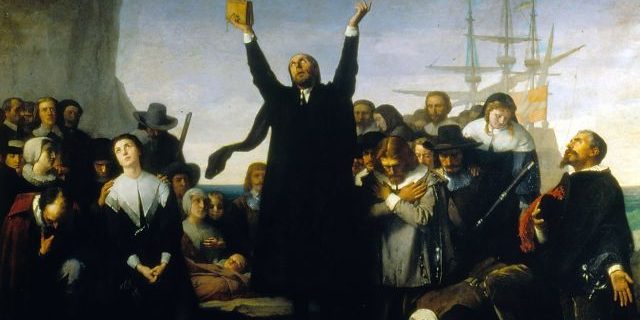
The painting “Desembarco de los Puritanos en America,” or “The Arrival of the Pilgrims in America,” by Antonio Gisbert shows Puritans landing in America in 1620. By Antonio Gisbert (1834-1902) [Public domain], via Wikimedia Commons
Summary
The first winter took many of the English at Plymouth. By fall 1621, only 53 remained of the 132 who had arrived on the Mayflower. But those who had survived brought in a harvest. And so, in keeping with tradition, the governor called the living 53 together for a three-day harvest feast, joined by more than 90 locals from the Wampanoag tribe. The meal was a moment to recognize the English plantation's small step toward stability and, hopefully, profit. This was no small thing. A first, deadly year was common. Getting through it was an accomplishment. England's successful colony of Virginia had had a massive death toll — of the 8,000 arrivals between 1607 and 1625, only 15 percent lived.
But still the English came to North America and still government and business leaders supported them. This was not without reason. In the 17th century, Europe was in upheaval and England's place in it unsure. Moreover, England was going through a period of internal instability that would culminate in the unthinkable — civil war in 1642 and regicide in 1649. England's colonies were born from this situation, and the colonies of Plymouth, Massachusetts Bay and the little-known colony of Providence Island in the Caribbean were part of a broader Puritan geopolitical strategy to solve England's problems.
Analysis
Throughout the first half of the 17th century, England was wracked by internal divisions that would lead to civil war in 1642. Religion was a huge part of this. The dispute was over the direction of the Church of England. Some factions favored “high” church practices that involved elaborate ritual. The Puritans, by contrast, wanted to clear the national religion of what they considered Catholic traces. This religious crisis compounded a political crisis at the highest levels of government, pitting Parliament against the monarchy.
By the beginning of the 17th century, England had undergone centralizing reforms that gave the king and his Parliament unrestricted power to make laws. Balance was needed. The king had the power to call Parliament into session and dismiss it. Parliament had the power to grant him vital funds needed for war or to pay down debt. However, Parliament had powerful Puritan factions that sought not only to advance their sectarian cause but also to advance the power of Parliament beyond its constraints. Kings James I and his son Charles I, for their part, sought to gain an unrestrained hold on power that would enable them to make decisive strategic choices abroad. They relied, internally and externally, on Catholics, crypto-Catholics and high church advocates — exacerbating the displeasure of Parliament.
Both kings continually fought with Parliament over funding for the monarchy's debt and for new ventures. Both dissolved Parliament several times; Charles ultimately did so for a full 11 years beginning in 1629.
Click to Enlarge
Spain was England's major strategic problem on the Continent. Protestant England saw itself as under constant threat from the Catholic powers in Europe. This led to problems when the people came to see their leaders, James I and his son Charles, as insufficiently hostile to Spain and insufficiently committed to the Protestant cause on the Continent. In order to stop mounting debt, shortly after taking power James made the unpopular move of ending a war with Spain that England had been waging alongside the Netherlands since 1585. In 1618, the Thirty Years' War broke out in the German states — a war that, in part, pitted Protestants against Catholics and spread throughout Central Europe. James did not wish to become involved in the war. In 1620, the Catholic Holy Roman Emperor Ferdinand II, a relative of Spain's King Philip III, pushed Frederick V, the Protestant son-in-law of England's King James, out of his lands in Bohemia, and Spain attacked Frederick in his other lands in the Rhineland. The English monarchy called for a defense of Frederick but was unwilling to commit to significant military action to aid him.




